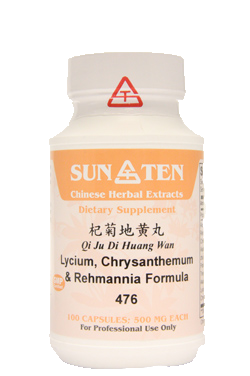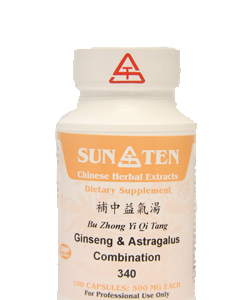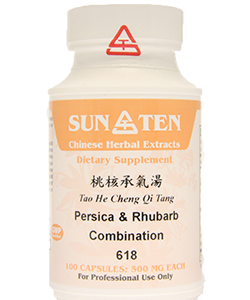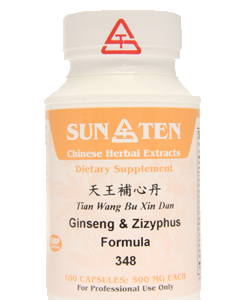Lycium ,Chrysanthemum & Rehman
$22.80
Product Description
Qi Ju Di Huang Wan
- Eye Health: Dry Eyes
- Eye Health: Vision
Sun Ten Qi Ju Di Huang Wan 100 capsules
What Qi Ju Di Huang Wan is Best For
Qi Ju Di Huang Wan is recommended for people with dry eyes, eye pain, and vision issues.
Qi Ju Di Huang Wan may be used for the following:
- Dizziness
- Eyes-Dry
- Eyes-Pain
- Eyes-Vision Problems
- Pain-Eyes
- Pain-Unilateral
- Sensitivity-Sunlight
- Sleep-Restless
- Sweating-Night
- Tearing-Wind
- Vertigo
- Vision-Clouded
- Vision-Decreased Acuity
Qi Ju Di Huang Wan helps with these Chinese Medicine patterns
- Liver-Deficient
- Kidney Yin-Deficient
- Kidney Blood-Deficient
Qi Ju Di Huang Wan History
Qi Ju Di Huang Wan translates as Lycium Fruit, Chrysanthemum, and Rehmannia Pill was formulated just over two hundred years ago as a relatively modern variation of the classic formula Liu Wei Di Huang Wan. This formula is named after the two additional ingredients, gou qi zi and ju hua, that differentiate Qi Ju Di Huang Wan from its predecessor. A third ingredient, shu di huang, is also named because it strongly supports the formula’s primary function of improving vision.
Qi Ju Di Huang Wan Ingredient Functions
Shu Di Huang: an anti-aging herb that also relieves anemic symptoms
Shan Zhu Yu: a fruit that regulates menstrual cycle and stops abnormal fluid leakage
Shan Yao: Chinese yam boosts energy and helps with digestive and urinary conditions
Ze Xie: an herb that relieves painful urination, stops diarrhea, and reduces dizziness
Mu Dan Pi: a type of bark that clears internal heat and improves blood circulation
Fu Ling: a sweet herb that balances the digestive system and promotes mental tranquility
Gou Qi Zi: a fruit that helps sharpen vision and relieve fatigue
Ju Hua: a flower that clears the eyes of redness, swelling, pain, or blurriness
Qi Ju Di Huang Wan Serving Size
2-4 capsules, 2 times per day
Qi Ju Di Huang Wan Ingredients
Concentrated powders of natural herbal products tend to absorb moisture from the air. Hence, it is necessary for the manufacturer to add a suitable amount of excipient to stabilize the concentrated herbal products. Non-GMO starch are used as excipients.
| Pin Yin | English | Percentage |
|---|---|---|
| Shu Di Huang | Rehmannia (Cooked) | 27.7% |
| Shan Zhu Yu | Cornus | 13.8% |
| Shan Yao | Dioscorea | 13.8% |
| Fu Ling | Poria | 10.3% |
| Mu Dan Pi (Su) | Moutan | 10.3% |
| Ze Xie | Alisma | 10.3% |
| Gou Qi Zi | Lycium Fruit | 6.9% |
| Ju Hua | Chrysanthemum | 6.9% |
Read Qi Ju Di Huang Wan 100 capsules Reviews
Maciocia, Giovanni. The Foundations of Chinese Medicine: A Comprehensive Text.Seattle, WA: Eastland Press, Inc. 2009. Print.
Bensky, D., Barolet, R. Formulas & Strategies Seattle, WA: Eastland Press, Inc 1990. Print







Reviews
There are no reviews yet.